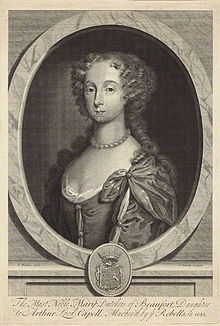Mary Capell
| Mary Somerset, Duchess of Beaufort | |
|---|---|

Engraving by Joseph Nutting after Robert Walker
|
|
| Born | baptised 16 December 1630 Hadham Parva |
| Died | 7 January 1715 (aged 84) Chelsea |
| Resting place | St Michael and All Angels Church, Badminton |
| Nationality | English |
| Fields | Aristocrat and botanist |
| Known for | 12 volume herbarium and introduction of exotic species to English gardening |
| Influences | |
| Spouse | |
| Children |
|
Mary Somerset, Duchess of Beaufort (baptised 16 December 1630 – 7 January 1715) also known by her other married name of Mary Seymour, Lady Beauchamp and her maiden name Mary Capell, was an English noblewoman, gardener and botanist.
Mary was born in Hadham Parva, Hertfordshire, England sometime before 16 December 1630, on which date she was baptised. She was the daughter of Sir Arthur Capell, 1st Baron Capell of Hadham and Elizabeth Morrison.
On 28 June 1648, Mary married her first husband Henry Seymour, Lord Beauchamp, and they had one son and one daughter. Her husband was a Royalist, imprisoned during the English Civil War. Her second husband, whom she married on 17 August 1657 was Henry Somerset, who became 1st Duke of Beaufort, by whom she had six children.
During the Popish Plot, she was required in her husband's absence to call out the militia, to deal with a false alarm of a French invasion at the Isle of Purbeck, and did so "in a state of deadly fear". The supposed invasion, like much that happened (or failed to happen) during the Plot, was simply the result of public hysteria. Despite this moment of panic, in general she maintained a detached and rational attitude to the Plot, expressing her amazement that the informer William Bedloe, whom she knew to be "a villain whose word would not have been taken at sixpence", should now have "power to ruin any man". She attended the trial of the Catholic barrister Richard Langhorne, presumably in case Bedloe, a bitter enemy of her husband, made any charges against him, and took notes of the evidence. When Bedloe protested at her presence, the Lord Chief Justice, William Scroggs, pointed out that the trial was open to the public, and asked irritably what a woman's notes amounted to anyway: "no more than her tongue, truly".
She was a notoriously exacting employer "striking terror in the hearts of her servants": every day she would do a tour of the house and grounds, and any servant not found hard at work was instantly dismissed. Even neighbouring landowners held her in awe, and were anxious not to cross her.
...
Wikipedia
